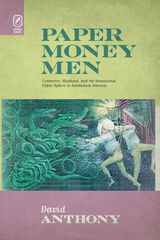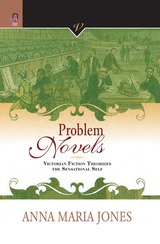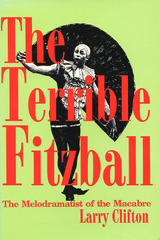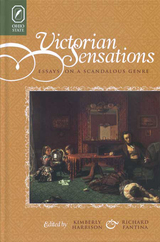5 books about Sensationalism in literature

Mixed Feelings
Feminism, Mass Culture, and Victorian Sensationalism
Cvetkovich, Ann
Rutgers University Press, 1992
Arguing that affect has a history, Ann Cvetkovich challenges both nineteenth- and twentieth-century claims that the expression of feeling is naturally or intrinsically liberating or reactionary. The central focus of Mixed Feelings is the Victorian sensation novel, the fad genre of the 1860s, whose controversial popularity marks an important moment in the history of mass culture. Drawing on Marxist, feminist, and Foucauldian cultural theory, Cvetkovich investigates the sensation novel's power to produce emotional responses, its representation of social problems as affective ones, and the difficulties involved in assessing the genre as either reactionary or subversive. She is particularly concerned with the relation of gender and affect since many of the sensation novels were written by and for women, and women. By examining the powerful conjunction of ideologies of affect, gender, and mass culture, Cvetkovich reveals the powerful political effects of affective expression and sensational representations.
[more]

Paper Money Men
Commerce, Manhood, and the Sensational Public Sphere in Antebellum America
David Anthony
The Ohio State University Press
Paper Money Men: Commerce, Manhood, and the Sensational Public Sphere in Antebellum America by David Anthony outlines the emergence of a “sensational public sphere” in antebellum America. It argues that this new representational space reflected and helped shape the intricate relationship between commerce and masculine sensibility in a period of dramatic economic upheaval. Looking at a variety of sensational media—from penny press newspapers and pulpy dime novels to the work of well-known writers such as Irving, Hawthorne, and Melville—this book counters the common critical notion that the period’s sensationalism addressed a primarily working-class audience. Instead, Paper Money Men shows how a wide variety of sensational media was in fact aimed principally at an emergent class of young professional men. “Paper money men” were caught in the transition from an older and more stable mercantilist economy to a panic-prone economic system centered on credit and speculation. And, Anthony argues, they found themselves reflected in the sensational public sphere, a fantasy space in which new models of professional manhood were repeatedly staged and negotiated. Compensatory in nature, these alternative models of manhood rejected fiscal security and property as markers of a stable selfhood, looking instead toward intangible factors such as emotion and race in an effort to forge a secure sense of manhood in an age of intense uncertainty.
[more]

PROBLEM NOVELS
VICTORIAN FICTION THEORIZES THE SENSATIONAL SELF
ANNA MARIA JONES
The Ohio State University Press
In Problem Novels, Anna Maria Jones argues that, far from participating “invisibly” in disciplinary regimes, many Victorian novels articulate sophisticated theories about the role of the novel in the formation of the self. In fact, it is rare to find a Victorian novel in which questions about the danger or utility of novel reading are not embedded within the narrative. In other words, one of the stories that the Victorian novel tells, over and over again, is the story of what novels do to readers. This story occurs in moments that call attention to the reader’s engagement with the text.
In chapters on Wilkie Collins, Anthony Trollope, and George Meredith, Jones examines “problem novels”—that is, novels that both narrate and invite problematic reading as part of their theorizing of cultural production. Problem Novels demonstrates that these works posit a culturally imbedded, sensationally susceptible reader and, at the same time, present a methodology for critical engagement with cultural texts. Thus, the novels theorize, paradoxically, a reader who is both unconsciously interpellated and critically empowered. And, Jones argues, it is this paradoxical construction of the unconscious/critical subject that re-emerges in the theoretical paradigms of Victorian cultural studies scholarship. Indeed, as Problem Novels shows, Victorianists’ attachments to critical “detective work” closely resemble the sensational attachments that we assume shaped Victorian novel readers.
[more]

The Terrible Fitzball
The Melodramatist of the Macabre
Larry Stephen Clifton
University of Wisconsin Press, 1993
The greatest portrayer of blue-fire deviltry, Edward Fitzball was a melodramatist on the nineteenth-century British stage. His Theatre of the Macabre was very much a forebearer of the sensationalized media of today. This book discusses Fitzball’s life, and his dramatic oeuvre.
[more]

VICTORIAN SENSATIONS
ESSAYS ON A SCANDALOUS GENRE
KIMBERLY HARRISON
The Ohio State University Press, 2006
Wildly popular with Victorian readers, sensation fiction was condemned by most critics for scandalous content and formal features that deviated from respectable Victorian realism. Victorian Sensations is the first collection to examine sensation fiction as a whole, showing it to push genre boundaries and resist easy classification. Comprehensive in scope, this collection includes twenty original essays employing various critical approaches to cover a range of topics that will interest many readers. In addition to well-known novels such as The Woman in White by Wilkie Collins and Lady Audley’s Secret by Mary Elizabeth Braddon, this volume addresses other works by Collins and Braddon as well as those of Sheridan Le Fanu, Rhoda Broughton, Charles Reade, Ellen (Mrs. Henry) Wood, and perhaps surprisingly, Charles Dickens and Thomas Hardy. Sensation literature, once considered one-dimensionally as a vehicle for contrived, plot-driven stories of mystery and intrigue, is shown here as a multi-faceted formal and ideological hybrid. Essays are organized thematically into three sections: issues of genre; sensational representations of gender and sexuality; and the texts’ complex readings of diverse social and cultural phenomena such as class, race, and empire. The introduction reviews critical reception of sensation fiction to situate these new essays within a larger scholarly context. Victorian Sensations aims to further previous efforts to recognize sensation fiction as an integral part of Victorian literature and not as the subgenre that it has too long been considered. The collection’s broad scope indicates the breadth and complexity of the genre itself.
[more]
READERS
Browse our collection.
PUBLISHERS
See BiblioVault's publisher services.
STUDENT SERVICES
Files for college accessibility offices.
UChicago Accessibility Resources
home | accessibility | search | about | contact us
BiblioVault ® 2001 - 2024
The University of Chicago Press









